SUMMARY
This is AI generated summarization, which may have errors. For context, always refer to the full article.
MANILA, Philippines – They walk with ease. They stand with poise, chins tilted up. These hijabi showed no signs of oppression or subjugation; they embodied royalty.
“Being a hijabi is not just about what you wear but it is also about how you act,” said World Hijab Day Ambassador of the Philippines Ammarah Sahara Biruar Dumama. Being a hijabi is also about being polite, kind, warm and welcoming to people.
Last February 1, Muslims and non-Muslims alike gathered in various cities around the world – including in Metro Manila, at the Quezon City Memorial Circle – to celebrate World Hijab Day 2014 (#WorldHijabDay), an international awareness day that seeks to educate people about the hijab and encourage non-Muslims to try it on for themselves.
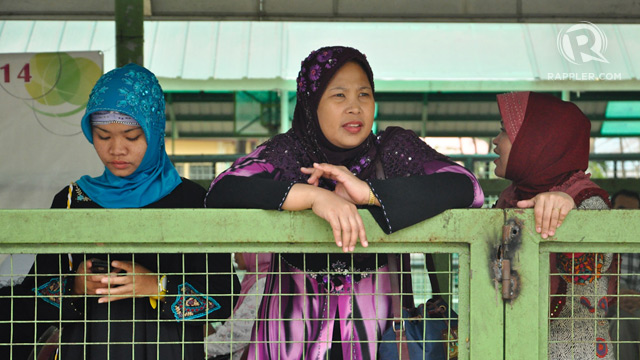
World Hijab Day began in New York and was founded by Bangladeshi-American Nazma Khan. She believes the only way to end discrimination against Muslim women was to ask other women to experience wearing the hijab. Celebrations took place in 116 other countries. (READ: Muslim women: ‘We are not limited because we wear a hijab’ )
“Just because we wear a hijab doesn’t mean we aren’t empowered,” Dumama told Rappler.
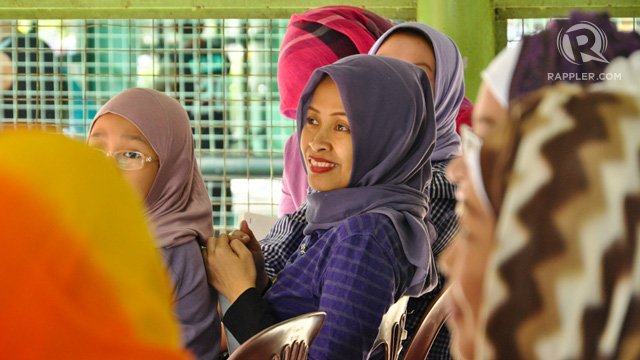
She is a hijabi. She wears the veil not to suppress, but to express – her faith, love and devotion to her God. The hijab is not a sign of inferiority, but a veil that commands respect, she will tell you. And she wears it with pride.
When she reaches her adolescence, she will put on the veil. A hijabi will cover her hips, her waist and much of her body. It is for her husband’s and God’s eyes only. But the modesty is something she says she wants. No one forced her. She is asked to cover and it would be her honor. But that version of the story is often a hard sell.
The trauma of 9/11, the endless violence in the Middle East, terror attacks, suicide bombings, movies, TV, media, rhetoric, misnomers have all tainted the true meaning of the hijab and turned it into a scarlet letter.
Stories of female suicide bombers made the hijab synonymous with the act.
“They called me a terrorist,” Caroline Yasmeen Lovely, who is also a World Hijab Day Ambassador told Rappler. “At siyempre, masakit yun,” she added. (Of course it hurts)
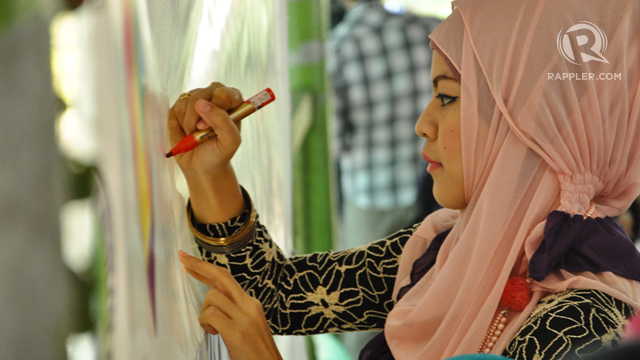
Lovely, who is from Zamboanga, converted to Islam (“Balik Islam”) 8 years ago. She now lives in Manila and admitted that she still feels strange sometimes being the only Muslim in her family. But she is happy.
Is the hijab required according to the Quran? Many believe it is, but some Islamic scholars are starting to question if the hijab is indeed an Islamic duty. One such scholar, Sheikh Mustapha Mohamed Rashed’s of Al Azhar University in Morroco, said in his controversial thesis that the Quran does not mention at all that all women must wear the hijab. A survey by Pew Research indicates that most Muslims are divided on this issue.
France’s move to ban the niqab – a variation of the hijab that covers the face – in 2011 was highly controversial. In some non-secular countries like the Islamic Republic of Iran, it is compulsory.
World Hijab Day was born to send a message to the world that the hijab should not be seen as a tool of oppression.
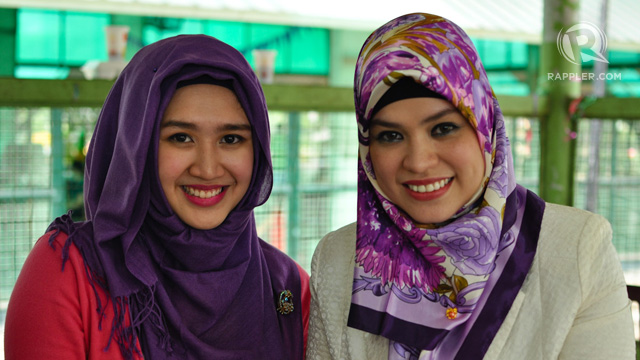
Ask other women
Muslims are an ethnic minority in the Philippines. According to the US’ International Religious Freedom Report, Filipino Muslims make up 5% to 9% of the total population – many of whom live in very poor areas in southern Mindanao and, many would argue, are among the most marginalized ethnic minorities in the country.
Citing a human development network report by the World Bank, Norhaiya Macusang, advocacy officer of AnakMindanao partylist representative Sitti A. Turabin-Hataman, revealed that 55% of Filipino respondents who took the survey said they believe Muslims are more likely to get angry and kill people, 47% of Filipinos believe Muslims are terrorists and 33% would not rent their homes to a Muslim.
One bill in Congress, House Bill 401 or the “Anti-Racial, Ethnic and Religious Discrimination Act of 2013,” filed by Tarlac Representative Susan Yap, would give the Commission on Human Rights penalize anyone found guilty discriminating against a person based on race, ethnic origin and religion. Congresswoman Hataman, a sponsor of Philippines’ World Hijab Day, is also supporting this bill.
As part of their “hijab for a day” activities, the Hijabi women looked for non-Muslims who were willing to wear the hijab for at least a few hours – to give them a better understanding of what it feels like. And no, they weren’t trying to convert anyone to Islam, Dumama clarified.
After the non-Muslim women put on the hijab, they were asked to scatter in the audience. The host asked “who among them are the Muslims and who are the Christians? Raise your hands if you can tell.” Not a single hand rose.
“How many non-Muslim women in the hijab now feel like terrorists,” they were asked. No one.
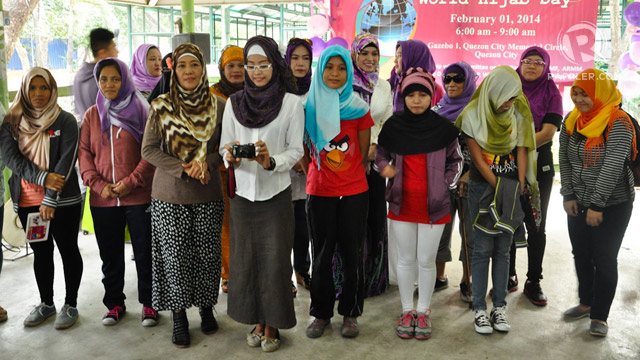
‘Walk a day in my shoes’
Later in the afternoon I found myself breaking bread with a Muslim family. It was a pleasant lunch.
The women at the table spoke openly and freely. They all shook my hand. They understand the same jokes and watch the same TV shows. They were indeed no different from anyone else. Was it surprising? Not at all.
I am not a woman nor I am not a Muslim, and I do not wear a hijab. I cannot pretend to understand what it is like to walk a day in their shoes. But the importance of attending the day’s event is this: the hijabi is also for peace. She has sat at the table during the GPH-MILF peace talks and not just as an observer. We all must learn to also sit at the table together.
The problem is not a question of whether the hijabi is oppressed. The problem is when we oversimplify complex issues. The problem is when we think we know better. The problem is when we fail to empathize.
A Christian woman named Dolores, who wore the hijab for a few hours that morning, said it best: ‘I gained respect for other hijabis by wearing one, and I gained a new respect for myself.’ – Rappler.com
Ryan Macasero is a Rappler social media producer. He was a freelance journalist based in the San Francisco Bay Area before he moved to Manila to join Rappler last May. Follow him on Twitter: @ryanmacasero
Add a comment
How does this make you feel?
There are no comments yet. Add your comment to start the conversation.